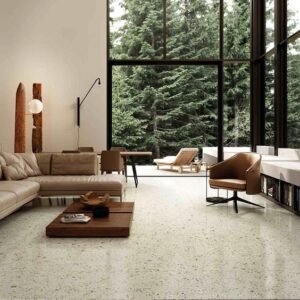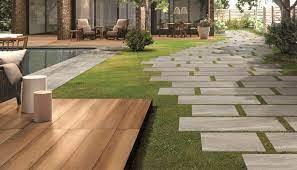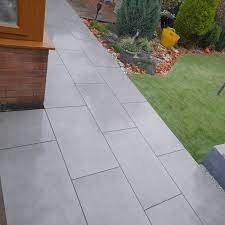One of the most exquisite additions to any patio or garden area is porcelain pavement. Porcelain patio slabs are widely accessible and may be used to produce any kind of style you choose for your outdoor project. The opulence of your outdoor paved area is enhanced by the designer vibe that permeates every porcelain patio tile. Each porcelain slab is expertly designed and manufactured, giving it a designer vibe.
The beauty of porcelain flags is that they may be used to create any style. The porcelain patio slabs’ subtle shimmer gives them an ultra-modern appearance and feel. Certain porcelain tiles can even be used to simulate rustic wood. Porcelain garden slabs provide the realistic appearance and texture that come only with natural stone, but they also have the necessary functional edge for outdoor pavement.

What are porcelain tiles made of?
A combination of clay, sand, and other minerals are baked to form porcelain tiles. After that, they are placed in a kiln with a high temperature. Porcelain pavement is a substance that is extremely durable and non-porous that is made from this.
Benefits of Porcelain Paving
There are several benefits of porcelain paving including:
- Because porcelain tiles are entirely non-porous, they require extremely minimal upkeep because no environmental factors will ever harm them.
- There is no need to use a sealer when installing porcelain slabs in your garden because the flags are naturally stain and mildew resistant. Porcelain outdoor slabs are impervious to spilled liquids or oils. Rather, all you have to do is clean up any spills of oil or chemicals. Fungus growth can also easily removed.
- Because of the chemical composition and production technique, porcelain pavement slabs are incredibly durable and maintain their original appearance for an extended amount of time.
- Because porcelain patio slabs are resistant to scratches, they are an excellent choice for paving pathways with a lot of foot traffic as well as outdoor dining spaces with garden tables and chairs.
- Because porcelain tiles are manufactured in factories, their sizes are always precise, enabling tiny connections to be installed. Your yard will seem really appealing and contemporary thanks to these thin connections. The purposeful variance in surface finishes, along with a subdued tint and variation in surface, adds even more character to porcelain slabs.
- A seamless transition between an indoor and outdoor eating space may be achieved by matching several outdoor porcelain tiles with inside tiles.


Porcelain Paving vs. Natural Stone Paving
The beauty of natural stone pavement is undeniable. Most porcelain pavers firmly think that porcelain pavement is a more aesthetically pleasing and long-lasting paving choice.
They believe that porcelain flags, whether installed indoors or outdoors, have advantages over genuine stone. Porcelain pavement slabs require less upkeep than genuine stone. Without a sealer, they are resistant to moisture and have less of an environmental effect than real stone paving.
Below are the differences between porcelain paving and natural stone paving.
Lesser maintenance
The porosity of natural stone pavement varies. This indicates that it is quite improbable that you would come across a totally non-porous natural stone paving solution. Because porcelain has a relatively low porosity, it is a great alternative to genuine stone pavement for outdoor applications. Porcelain garden slabs really absorb less than 0.05% of surface water, according to study.
Many natural stone varieties, such as sandstone, need to be sealed on a regular basis. This is a result of their sealant fading and weathering over time. As a result, the natural stone will be exposed to water damage and will not be protected. Porcelain patio slabs, however, never require sealing. You won’t need to do any more maintenance for years to come to keep it water-resistant.
Environment Friendly
Porcelain outdoor slabs are ideal if you want to reduce your carbon footprint and contribute to making the planet a greener place for everyone. Slabs of porcelain paving are very environmentally beneficial. This is a result of their minimum waste production process and usage of natural raw resources. Even the smallest amount of trash is really recycled back into the production process. Furthermore, there are no potentially environmentally hazardous waterproofing chemicals, varnishes, or resins in porcelain garden slabs.
Resistant to moisture
Porcelain patio tiles are extremely resistant to moisture due to their excellent water resistance. This is fantastic news since it means porcelain slabs won’t become stained. A simple wipe down with some warm, soapy water will be all that’s needed for cleaning. After that, your porcelain flags will be free of any dirt or organic material, like grass, soil, leaves, bird droppings, etc.
Porcelain outdoor slabs may also be cleaned with a power washer if you’d like; the surface won’t be harmed in any way.

Why choose porcelain tiles for outdoor paving?
Most floor pavers use porcelain outdoor slabs for their outdoor paving solution for four primary reasons.
- Slabs of porcelain pavers need little upkeep and are simple to clean.
- Porcelain flags provide an improved alternative to non-slip pavement.
- Paving slabs made of porcelain have a great stain and scratch resistance.
- There is a vast array of hues and sizes available for porcelain garden slabs.
Difference Between Ceramic, Vitrified, and Porcelain Paving
Manufacturers use three terminology related to pavement interchangeably. Porcelain, vitrified, and ceramic varieties exist. Despite their common usage, there are a few minor distinctions between the two names.
Porcelain and vitrified paver slabs, for instance, are more appropriate for outdoor use. This is a result of the clay used in their creation. These clays undergo extremely high firing temperatures. This results in a firm, long-lasting finish.
On the other hand, the word “ceramic” may apply to a wide range of substances, including Italian porcelain pavement slabs. Some of these additional materials, nevertheless, might not be appropriate for outdoor usage.
Make sure the ceramic pavement you are considering for your outdoor living area is appropriate for its intended use.
